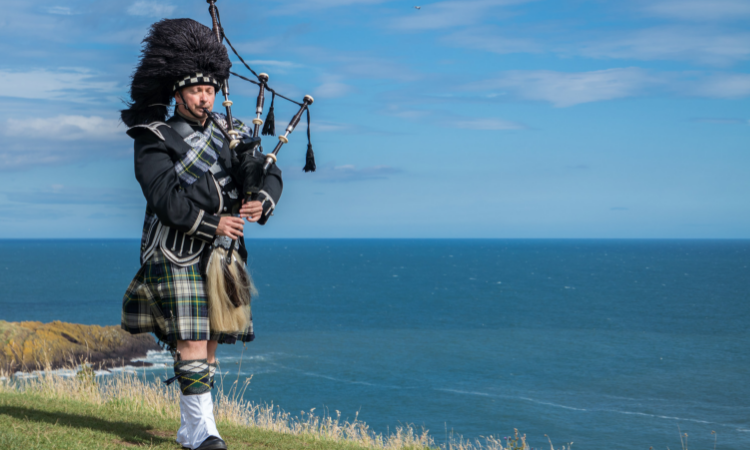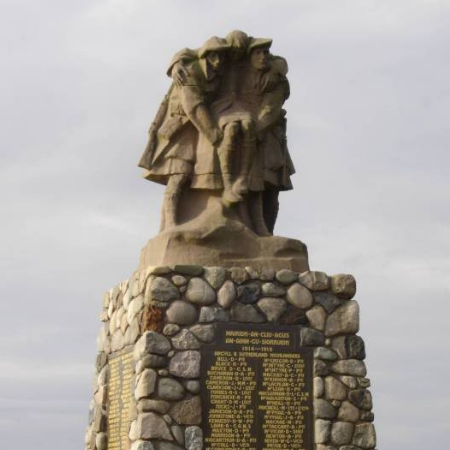 Against machine guns and poison gas
Against machine guns and poison gas
After dinner here in Oban, our gang walked back to our B&B along the water front, past a small, grassy square. There were about 20 men and women with bag pipes and drums, playing, marching and rehearsing for what, I assumed was an upcoming competition or festival. Only one man was dressed in full Scots regalia, kilts, knee-socks, codpiece, the works. Why everyone else was in street clothes, I can’t tell you.
My wife, who’s half Irish and half Italian, always starts quietly sobbing when she hears bagpipes fire up. Not quite sure why. Probably a combination of the weird, mournful wailing and memories of her long dead Irish grandfather, Jerry. And, particularly, the way Jerry became a near second father to her brother, Cliff, Jr., who was killed by friendly fire shortly after he was drafted and shipped over to Vietnam.
According to schedule
It’s gotten to the point where bagpipes often have a similar effect on me: a catch in my throat, at the least. I might even have to wipe away a tear or two. Why? Similar reasons. The mournful wailing. And death. But not for a relative. It’s for what happened to Western Civilization in the blood soaked trenches of World War I. France. England. Russia. America. Germany. Italy. The list goes on. They all lost their collective minds. Nearly 40 million dead and wounded, military and civilian. The U.S. was a bit player in terms of casualties-but it played a decisive role in turning back a nearly successful, final German offensive that resulted in that nation’s exhaustion and defeat.
World War I has been called the “Timetable War” because of the limitations of the rail systems that were required to mobilize the hundreds of thousands of troops in the lead-up to the plunge into the abattoirs. When that volume of trains are set in motion in such a compressed timeframe, they basically become one-way vehicles: they’re very difficult to turn around and there aren’t any passing lanes. Once the order to go to war was given, the various hostile powers couldn’t reverse it without running the risk that their cross border enemy wouldn’t do the same. And leave their own forces trapped in trains in a hopeless traffic jam.
So the flower of Europe’s youth perished-way ahead of schedule.
They’re everywhere
Here, the reminders of death are everywhere. Stop in any of the little towns we’ve gone through and you’re almost sure to see a war memorial inscribed with the names of the dead from history’s bloodiest century, the 20th. World War I. World War II. Korea. But in the towns we’ve been through, WWI was by far the bloodiest for Britain.
But it’s not just the lives that were lost. Or, as awful as it sounds, perhaps even the most important thing that was lost. The bloody Napoleonic Wars had come to an end about a century earlier in 1815. In the 100 years between the end of those wars and the start of WWI, Europe and much of the rest of the world largely enjoyed peace. And relative prosperity. Britain played world cop. Western Civilization flourished. They call it Pax Britannica.
But it all came crashing down on July 28, 1914. And since World War II was really just a continuation of World War I’s bloodletting (except on steroids), the fighting didn’t really end until the atom bomb was dropped and the Japanese surrendered in Tokyo harbor on September 2, 1945. Western Civilization still hasn’t recovered its sense of optimism and self-confidence that was lost in the madness of supposedly “advanced” societies tearing at each others vitals like rabid dogs.
The Pals
The next morning, I looked to my right down the Oban waterfront. There, several hundred yards away was a column. I walked down and, sure enough, it was a war memorial. Rough hewn and rustic, there were dozens and dozens of names. Although all of the 20th century’s wars were represented, overwhelmingly the dead were from “The Great War.”
To encourage enlistment, the British military established “Pals” battalions. This allowed young men from the same town or school to enlist with their friends rather being randomly assigned to units full of strangers. The Pal system worked-with often horrifying consequences. In the 1916 Somme offensive, of 700 Pals from the small town of Accrington, 235 were killed and 350 were wounded in the space of 30 minutes.
Were the many Scottish soldiers whose names were etched on the Oban memorial Pals? Did they “go over the top” behind wailing bagpipers in tartan kilts? I don’t know. But one of the soldiers at the top of the memorial has on a stone kilt. And, more importantly, who can think of this madness and not get a catch in their throat? And utter a prayer that we won’t repeat the insanity. And that, by the grace of God, Western Civilization might someday come to a recognition that it has a great deal to offer a world that still needs what it has. At least when it’s at its best.





